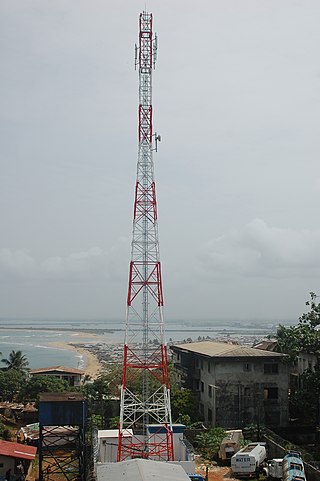Top Qs
Timeline
Chat
Perspective
Mass media in Liberia
From Wikipedia, the free encyclopedia
Remove ads
Mass media in Liberia include the press, radio, television, fixed and mobile telephones, and the Internet. Much of Liberia's communications infrastructure was destroyed or plundered during the two civil wars (1989–1996 and 1999–2003).[1] With low rates of adult literacy and high poverty rates, television and newspaper use is limited, leaving radio as the predominant means of communicating with the public.[2] Even as it struggles with economic and political constraints, Liberia's media environment is expanding. The number of registered newspapers and radio stations (many of them community stations) is on the rise despite limited market potential. And politically critical content and investigative pieces do get published or broadcast.[3]

Remove ads
Press
The main newspapers are:[4]
- The Analyst[5][6]
- Pumah Times Newspaper
- Daily Observer (est. 1981), private.[5][7][6]
- The Daily Talk[8]
- FrontPage Africa, private.[7]
- The Inquirer, private daily.[7]
- National Chronicle[9]
- The New Dawn, private daily.[7]
- New Democrat[5]
- New Republic Liberia[10]
Defunct newspapers and magazines include:[11]
- Africa League
- African Nationalist[12]
- Africa's Luminary (est. 1839)
- Amulet (est. 1839)
- Daily Listener (est. 1950)
- Footprints Today (est. 1984)
- Geez Liberia
- The Friend
- Independent Weekly
- Journal of Commerce and Industry
- Liberia and West Africa (ceased in 1932)
- Liberia Herald (est. 1826)[13]
- Liberian Age (est. 1946)
- Liberian Herald
- Liberian News[12]
- Liberian Recorder (est. 1897)
- Liberian Star (est. 1839)
- Monrovia Observer (est. 1878)
- Palm Magazine
- SunTimes
- Weekly Mirror[12]
- Whirlwind[12]
Remove ads
Radio
- Radios: 790,000 radio receivers (1997).[needs update]
- Radio stations: 1 state-owned radio station, but no national public service broadcaster;[14] about 15 independent radio stations broadcasting in Monrovia, with another 25 local stations operating in other areas; transmissions of 2 international broadcasters are available (2007).[15]
- BBC World Service 103 FM.[7]
- ELBC FM, public.[16]
- ELWA FM and SW, private, religious-Christian.[7]
- Pumah FM 106.3
- LUX 106.6 FM, University of Liberia.
- Radio Liberia FM, operated by the state-run Liberian Broadcasting System (LBS).[7][6]
- Radio Veritas FM and SW, religious-Catholic.[9]
- RFI English FM, the English service of Radio France Internationale.[16]
- Sky FM[7]
- STAR Radio FM and SW, operated in partnership with Swiss-based Hirondelle Foundation.[5][7][17]
- Truth FM[5]
- UNMIL Radio FM, operated by the United Nations mission.[7]
- Voice of Firestone Liberia 89.5 FM[18]
Remove ads
Television
- Television sets: 70,000 sets (1997).[needs update]
- Pumah TV Channel 4
- Television stations: 4 private TV stations, none with national reach;[7] satellite TV service available (2007).[15]
- Liberia Broadcasting System: Government owned Liberia National Television (LNTV).
Telephones
Summarize
Perspective

- Calling code: +231 [19]
- International call prefix: 00[20]
- Main lines: 3,200 lines in use, 213th in the world (2011).[15]
- Mobile cellular: 2.4 million lines, 138th in the world (2012).[15]
- Telephone system: the limited services available are found almost exclusively in the capital Monrovia; fixed-line service stagnant and extremely limited; telephone coverage extended to a number of other towns and rural areas by four mobile-cellular network operators; mobile-cellular subscription base growing and teledensity reached 50 per 100 persons (2011).[15]
- Satellite earth stations: 1 Intelsat (Atlantic Ocean) (2010).[15]
- Communications cables: Africa Coast to Europe (ACE) cable system, links countries along the west coast of Africa to each other and on to Portugal and France.[21]
The fixed line infrastructure of Liberia was nearly completely destroyed during the civil wars (1989-1996 and 1999–2003).[1]
Prior to the passage of the Telecommunications Act of 2007, the state-owned Liberia Telecommunications Corporation (LIBTELCO) held a legal monopoly for all fixed line services in Liberia, and remains the sole licensed fixed line telephone service provider in the country.[22]
Two licensed GSM cellular mobile service providers operate in the country: Lonestar Cell and CellCom. Approximately 45% of the population has cell phone service.[1]
Remove ads
Internet
Summarize
Perspective
- Top-level domain: .lr[15]
- Internet users:
- Fixed broadband: 78 subscriptions, 193rd in the world; less than 0.05% of the population, 192nd in the world (2012).[23][25]
- Wireless broadband: Unknown (2012).[26]
- Internet hosts: 7 hosts, 228th in the world (2012).[15]
- IPv4: 13,312 addresses allocated, less than 0.05% of the world total, 3.4 addresses per 1000 people (2012).[27][28]
Notable commercial websites
While Liberia's commercial internet sector is still behind the majority of African countries there are still a few classifieds sites:[citation needed]
Internet censorship and surveillance
There are no government restrictions on access to the Internet or reports that the government monitors e-mail or Internet chat rooms.[29]
The constitution provides for freedom of speech and press, and the government generally respects these rights in practice. Libel and national security laws place some limits on freedom of speech. Individuals can generally criticize the government publicly or privately without reprisal. Some journalists practice self-censorship. The constitution prohibits arbitrary interference with privacy, family, home, or correspondence, and the government generally respects these prohibitions in practice.[29]
President Sirleaf endorsed and signed the World Association of Newspapers and News Publishers' Declaration of Table Mountain in Monrovia on 21 July 2012, committing to the core principles of a free press and calling for the repeal of the criminal defamation and insult laws regularly used against journalists.[29]
Remove ads
See also
- Liberia Telecommunications Corporation, the sole provider of fixed line telephone services in Liberia.
- Cable Consortium of Liberia, a public-private partnership formed in 2010 to own and operate Liberia's cable landing point for the ACE cable system.
- The Liberian Journal, a US-based Liberian online and print news organization covering issues of interest to Liberians in the Diaspora.
- Cinema of Liberia
Remove ads
References
Bibliography
External links
Wikiwand - on
Seamless Wikipedia browsing. On steroids.
Remove ads
